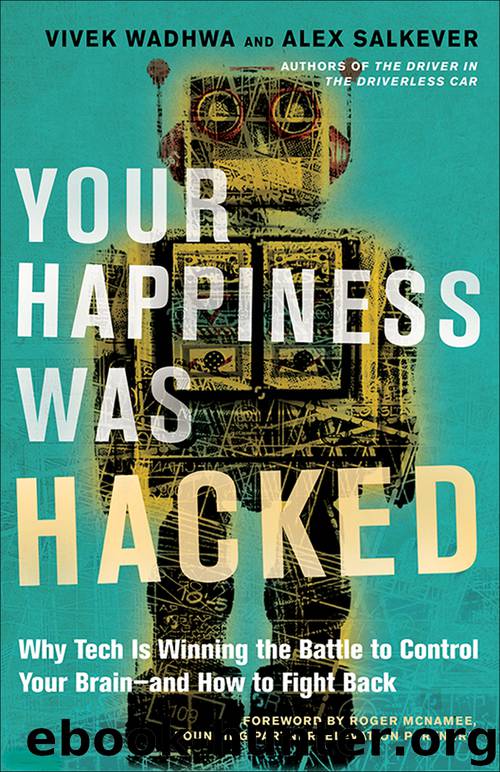Your Happiness Was Hacked by Vivek Wadhwa

Author:Vivek Wadhwa
Language: eng
Format: epub
Publisher: Berrett-Koehler Publishers
Published: 2018-07-11T16:00:00+00:00
How Technology Changes Our Brains
Because evidence suggests that even into old age our brains are more plastic than we had ever imagined they were, the effects of technology use on the physical structure and functional systems of our brains are worth examining. Already, clear evidence shows that screen technologies change our fundamental brain structure. London black-cab drivers must pass a daunting test of geospatial acuity called “the Knowledge” before they can receive their licenses. Researchers performed functional magnetic resonance imaging (fMRI) on cabbie trainees prior to their intense studies to acquire the Knowledge and again after they passed the Knowledge test successfully. In the second MRI, the cabbies who had passed showed an increase in the size of the posterior hippocampus, a part of the brain associated with spatial memory.
Subsequent experiments have shown worrying effects of using GPS devices or turn-by-turn software in lieu of navigating by reading maps or using landmarks. Researchers at McGill University in Canada used fMRIs to compare the brain activity of older people who used GPS devices and those who used landmarks to find their way.45 The researchers noted significantly lower brain activity in the hippocampi of GPS users. They speculated that low brain activity could lead to atrophy of the hippocampus, which might lead to cognitive disorders later in life. Alzheimer’s disease is associated with impairments to the hippocampus, causing its sufferers difficulty with spatial orientation and remembering where they are. Researchers also found a greater volume of gray matter in those who used spatial navigation, and this group scored higher on standardized cognition tests. This research suggests that using maps and building cognitive maps is better for the brain over the long term than relying predominantly on GPS.
There are probably other ways in which using tech in lieu of our memory compromises our brain function and potentially our ability to do big-picture thinking. For instance, Nicholas Carr makes the argument that Google search activities have reduced our ability to read deeply and replaced it with a proclivity to skim.46 He cites a study by researchers from University College London that found that visitors to two popular research sites rarely read more than one or two pages and bounce quickly from one hyperlink to the next.47 Carr made the controversial argument that Google is actually making us stupid, which we don’t believe is true.
In fact, there is plenty of counter-evidence suggesting that Google and heavy Internet usage does have beneficial effects such as enhanced brain function.48 And humans have long sought to use technology to aid memory, from lists to abacuses for calculation. But we have never before experienced technology that has supplanted reliance on our memory in so many capacities. I don’t mean only phone numbers, bank account numbers, and historical snippets; alarmingly, we now refer to YouTube to remind ourselves of skills that previously we fluently recalled: how to clean the lens of a camera, how to dice vegetables, and the like. And wayfinding and following directions to places fall into this category.
Download
This site does not store any files on its server. We only index and link to content provided by other sites. Please contact the content providers to delete copyright contents if any and email us, we'll remove relevant links or contents immediately.
| Automotive | Engineering |
| Transportation |
Whiskies Galore by Ian Buxton(40332)
Introduction to Aircraft Design (Cambridge Aerospace Series) by John P. Fielding(32338)
Small Unmanned Fixed-wing Aircraft Design by Andrew J. Keane Andras Sobester James P. Scanlan & András Sóbester & James P. Scanlan(32141)
Craft Beer for the Homebrewer by Michael Agnew(17447)
Turbulence by E. J. Noyes(7039)
The Complete Stick Figure Physics Tutorials by Allen Sarah(6638)
Kaplan MCAT General Chemistry Review by Kaplan(6054)
The Thirst by Nesbo Jo(5786)
Bad Blood by John Carreyrou(5769)
Learning SQL by Alan Beaulieu(5412)
Weapons of Math Destruction by Cathy O'Neil(5037)
Man-made Catastrophes and Risk Information Concealment by Dmitry Chernov & Didier Sornette(4736)
iGen by Jean M. Twenge(4702)
Digital Minimalism by Cal Newport;(4544)
Life 3.0: Being Human in the Age of Artificial Intelligence by Tegmark Max(4508)
Audition by Ryu Murakami(4099)
1,001 ASVAB Practice Questions For Dummies by Powers Rod(4039)
Electronic Devices & Circuits by Jacob Millman & Christos C. Halkias(4029)
Pale Blue Dot by Carl Sagan(4001)
